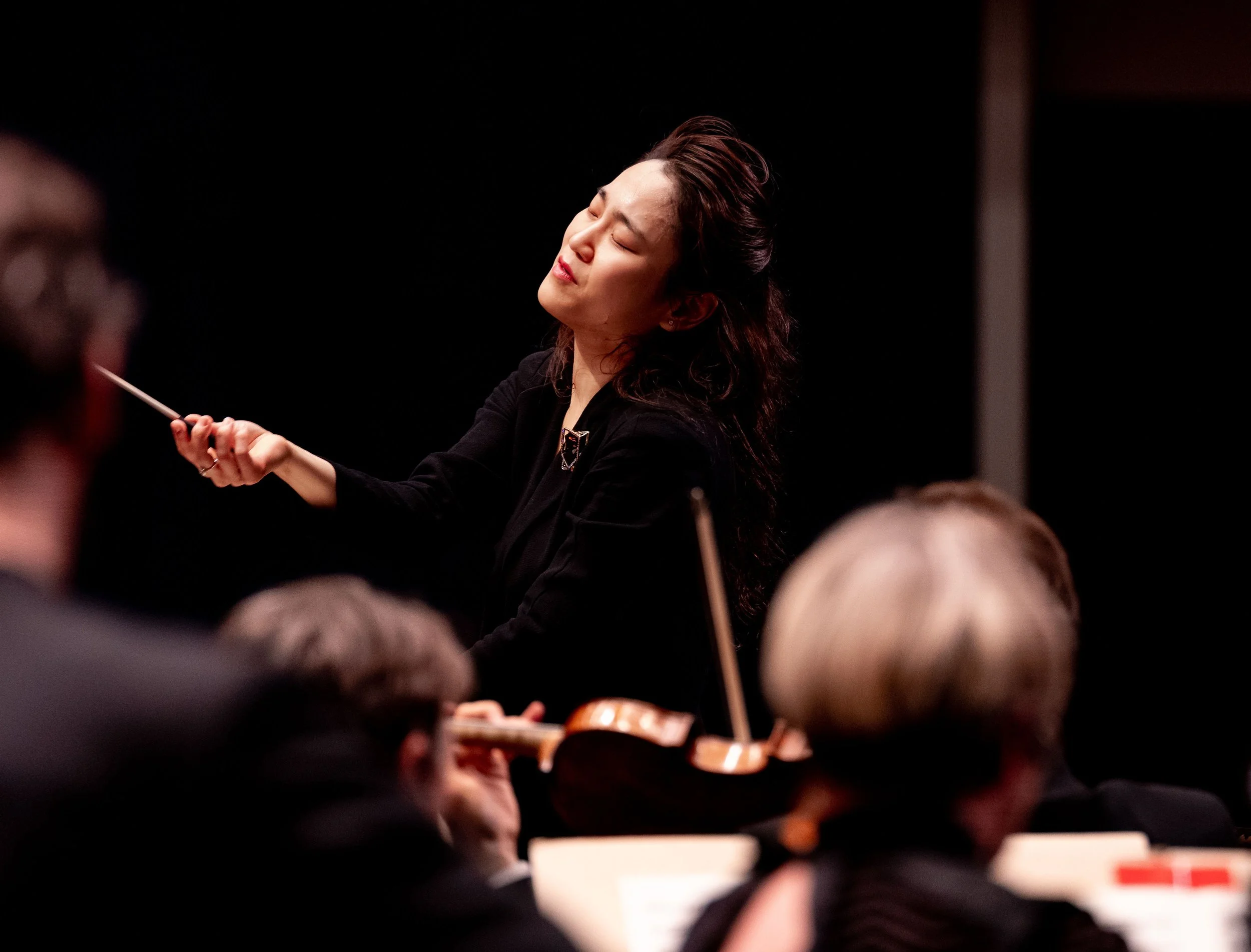NZSO’s Tchaikovsky 5: Han-Na Chang’s passionate empathy
Conductor Han-Na Chang
Photo credit: Kiran West
Leaving the Auckland Town Hall recently after NZSO's exhilarating ‘Tchaikovsky 5’ concert, I found myself beside a group of young women discussing women conductors. Korean-born Han-Na Chang had been in impressive charge of the orchestra that evening, and these young audience members were delighted to have seen a woman on the podium again and were counting up the female conductors they'd experienced.
Sadly, they probably needed the fingers of only one hand for their list.
Conducting is the last area of classical music with a conspicuous gender imbalance – so noticeable that a woman with a baton in front of an orchestra in the 21st century is still grounds for a post-concert conversation.
In New Zealand, we’ve seen conductors Gemma New, Tianyi Yu, Holly Mathieson and Shiyeon Sung working with our major orchestras in recent years. Japanese conductor Nodoka Okisawa will appear with the Auckland Philharmonia in September, and Yu and New are scheduled this year with NZSO.
I’ve raised this issue before, noting that the issue is mainly one of equality of opportunity. But that post-concert chat I overheard raises another question – will talented young female musicians aspire to the podium when available role models appear so infrequently?
Han-Na Chang was raised in New York, where she attended the Juilliard School. She began her professional musical life as a prodigious cellist, just 11 years old when she won both First Prize and Contemporary Music Prize at the Fifth Rostropovich International Cello Competition in Paris in 1994. These were awarded unanimously by the jury, led by Mstislav Rostropovich, who became an important mentor for the young musician.
After discovering Beethoven’s symphonies, Chang developed a passion for symphonic repertoire and shifted her musical career to the podium in her mid-twenties. In her performances with the NZSO she revealed a sometimes unconventional conducting approach, her movements often understated, dropping her right hand and baton to guide the music gently with her left, sometimes turning her body sideways to the orchestra. Her expressive face powerfully reflected the emotions and moods in the music.
Conductor Han-Na Chang
“…drew splendid playing from the NZSO.”
Of course, a conductor must be judged on an orchestra’s performance and interpretation of the music, and Chang drew splendid playing from the NZSO, a full and powerful string sound splendidly enhanced by the warm acoustic of the Town Hall, with precise ensemble work and outstanding individual solos and sectional playing from wind, brass and percussion.
The evening began with a world premiere. I watched a shadow, by Auckland composer Leonie Holmes, was inspired by a brooding nature-themed poem by Ann Powell, the composition closely following the poetic shape. Edgy, buzzing sounds punctuated by percussion shift to full, rich textures. Holmes uses the full orchestral range, right down to tuba solo with other low brass and expressive timpani, the increasingly sombre music reflecting a shadow rising up a hill. The composer doesn’t seek the clarity of counterpoint but what seems to be a deliberate blurring of sounds. “The hum of the universe”, in the poet’s words, is evoked with rich harmonic effects and a multi-layered texture. The piece builds and climbs over pounding timpani to a dark, effective climax.
Composer Leonie Holmes
“…inspired by poetry.”
Image credit: Gareth Watkins
Don Quixote followed, composer Richard Strauss in heroic story-telling mode. This tone poem is a theme and variations, Cervantes’ knight-errant represented by solo cello, played by the NZSO’s Principal Cellist Andrew Joyce. Strauss’s wide-ranging orchestration has brilliant and surprising colours, some weirdly dissonant moments and even antiphonal wind machines. It offers, too, many solo opportunities for the NZSO’s excellent section principals.
Particularly moving in gentle, romantic moments, Joyce’s solo line had a wistful poignancy as Don Quixote faces his limitations. The cello line is cradled at times by answering solos from characters represented by Concertmaster Vesa-Matti Leppänen’s lyrical violin and lovely playing from Principal Viola Julia Joyce. The viola section was positioned at the front of the stage to facilitate the conversations.
Cellist Andrew Joyce
“…a wistful poignancy as Don Quixote.”
Image supplied
Joyce’s cello playing was not always sufficiently ringing in tone to ride heroically over all of Strauss’s lush textures, but the composer acknowledges the challenge, calling at times on the full cello section for support. The whole whimsically shifting picture was beautifully managed by Chang.
The NZSO’s fine string sound was even more impressive in the programme’s main course, Tchaikovsky’s 5th Symphony in E minor Opus 64. It’s a work Chang has performed many times and she conducted without a score, showing virtuosic empathy for the composer’s music. In interviews, she has talked about how Tchaikovsky, so elegant and gentlemanly in his outer appearance, was struggling with a complex inner life, full of anguish and despair. Chang believes his power comes from the genuine expression of desire and passion, as he channels his inner turbulence into the music.
Her insights were evident in a marvellous, stirring and coherent performance of a much-loved work. From the opening - which Chang conducted tenderly without baton, using her left hand - she found melodious flexibility and a light sense of dance. Ensemble work was beautifully precise, timbres shone through the texture and the final vivace was brilliantly exciting, pushing onwards with urgency towards the broad grandeur of the work’s conclusion.
This was Chang’s NZSO debut and her first visit to Aotearoa. It shouldn’t be her last.
NZSO Tchaikovsky 5, music by Leonie Holmes, Richard Strauss and Pyotr Ilyich Tchaikovsky, Han-Na Chang (conductor), Andrew Joyce (cello) Julia Joyce (viola) Auckland and Wellington, 17-18 May 2024




